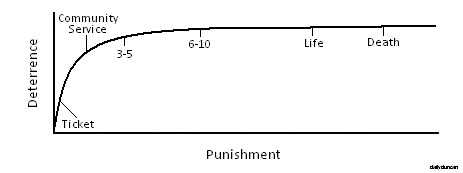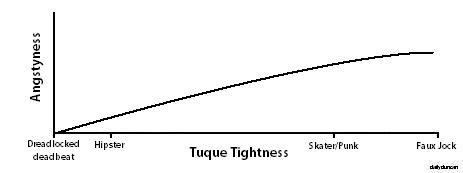Humans are rational creatures that behave irrationally. We do many things that make absolutely no sense, and some of these things can even hurt ourselves and others. A great example of this is the common motorist’s compulsion to exceed the speed limit. We all do it, but why?
It could be a behavioral remnant from our ancestors to keep at the front of the herd to avoid being picked off by predators. It may also be that a cost-benefit analysis determines that the benefit of getting to our destination more quickly outweighs the cost of a potential fine or collision.
Some people say that increased punishment doesn’t discourage crime, since someone planning to rob a bank wouldn’t reconsider if they were to learn of an increase in the minimum sentence for armed robbery. This is because the cost-benefit analysis is usually skewed by emotion or simply doesn’t take place at all. Another example is that people play the lottery.
Increased punishment doesn’t discourage crime, but a serious lack of punishment, or enforcement, can encourage crime. For if the punishment for robbing a bank was a $200.00 fine, or there was only a 1% chance of being caught, it is likely that we would all reach for our sack with a dollar sign on it.

We can see here that the knowledge of likely and significant punishment does discourage certain behavior, to a degree. If, however, we were to graph deterrence and enforcement, the graph would be much more linear. This is because the threat of punishment is empty without enforcement. Likewise, enforcement is meaningless if the punishment is not significant enough to cause offenders to reassess their strategy.
The punishment for speeding is fairly well-suited to the seriousness of the offence, so an increased in punishment likely wouldn’t convince motorists to slow down. The failure is likely in the extreme lack of dispensation of punishment.
It’s true that police are constantly on the road enforcing traffic laws, but how often do speeders get a ticket? What is the ratio of our infractions to tickets received? Though the exact statistics are unknown, it’s likely that each of us breaks traffic laws dozens, if not hundreds of times for each time we’re caught. The solution? Self-policing.
Since police can only catch a fraction of infractions, it only makes sense to allow drivers to collectively dispense punishment on one another. Every person with a valid driver’s license could report other drivers for their infractions and, based on those reports, tickets could be issued. The system would be computerized, online and fully automated, allowing whistleblowers to upload data from their personal computer or mobile device.
The jerk in a big truck who zips past you in a school zone? Reported.
What about the grandma driving into oncoming traffic with her high beams on? Reported.
That guy who keeps reporting you? Reported.
Obviously, there are some difficult details to work out, but once in place this system would increase revenue from traffic fines, clamp down on rampant speeding and free up the police force to tackle more serious matters.
If you don’t like this idea, it means you’re a big smelly speeder.



